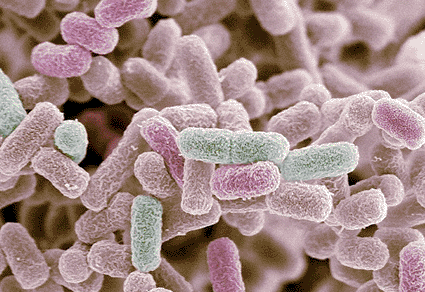New Generation of Antibiotics Disrupts Quorum Sensing
By LabMedica International staff writers
Posted on 24 Mar 2009
Drug developers are working on a new generation of antibiotics that do not kill bacteria but instead disrupt the communication system known as "quorum sensing,” which induces the microorganisms to manufacture disease-causing toxins.Posted on 24 Mar 2009
Several types of bacteria, including such human pathogens as Vibrio cholerae and Escherichia coli O157:H7, can grow within a host without harming it, until they reach a certain concentration. They become aggressive when their numbers become sufficient to overcome the host's immune system and form a biofilm, leading to disease. The language of quorum sensing is based on the bacterial population producing and detecting signaling molecules known as autoinducers.

Image: Colored scanning electron micrograph (SEM) of Escherichia coli bacteria (Photo courtesy of Steve Gschmeissner / SPL).
Investigators from the Albert Einstein College of Medicine (New York, NY, USA) focused on the bacterial enzyme 5'-methylthioadenosine/S-adenosylhomocysteine nucleosidase (MTAN), which is involved in S-adenosylmethionine–related quorum sensing pathways that induce bacterial pathogenesis factors. To block MTAN activity they created a series of transition state analogs, MT-DADMe-Immucillin-A, EtT-DADMe-Immucillin-A, and BuT-DADMe-Immucillin-A, which are slow-onset, tight-binding inhibitors of V. cholerae MTAN (VcMTAN).
Results published in the March 8, 2009, online edition of the journal Nature Chemical Biology revealed that in V. cholerae cells, the compounds were potent MTAN inhibitors. Structural analysis of VcMTAN with BuT-DADMe-Immucillin-A revealed interactions contributing to the high affinity. The compounds disrupted autoinducer production in a dose-dependent manner without affecting growth. MT- and BuT-DADMe-Immucillin-A also inhibited autoinducer-2 production in enterohemorrhagic E. coli O157:H7.
By targeting quorum sensing rather than bacterial growth, the new drugs avoided stimulating the bacteria into becoming resistant. The investigators tested the compounds on 26 successive generations of both bacterial species, and found that the 26th generations were as sensitive to the antibiotics as the first. "In our lab, we call these agents everlasting antibiotics,” said senior author Dr. Vern Schramm, professor of biochemistry at Albert Einstein College of Medicine.
Related Links:
Albert Einstein College of Medicine














